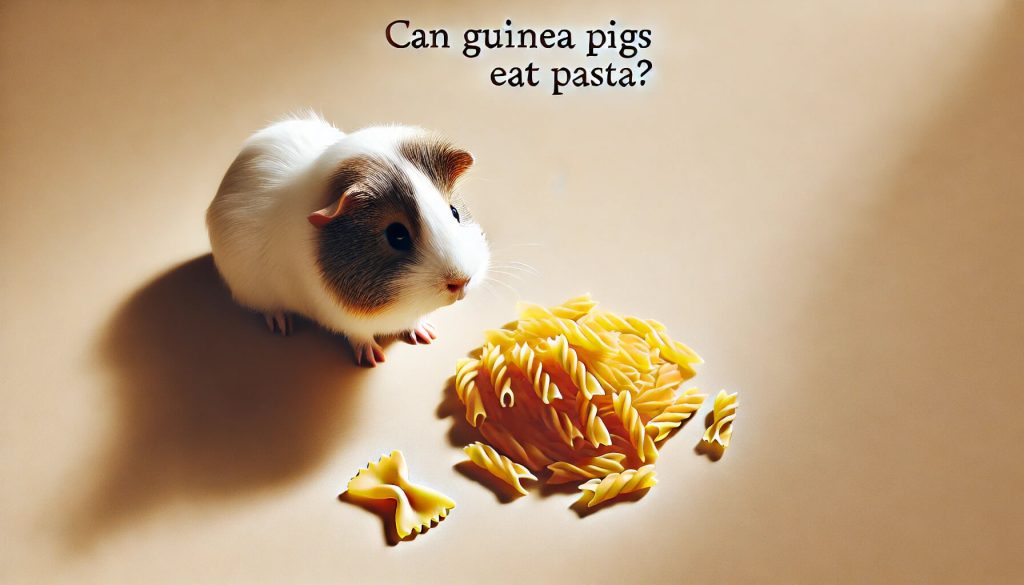
Can Guinea Pigs Eat Pasta?
Understanding Guinea Pig Dietary Needs
Guinea pigs require a balanced diet to stay healthy and active. Knowing what they can and can’t eat is essential for any pet owner.
What Do Guinea Pigs Normally Eat?
Guinea pigs mainly eat hay, which aids in digestion and keeps their teeth healthy. Timothy hay is an ideal choice. They also need fresh vegetables like bell peppers and cucumbers daily for essential nutrients. Fruit should be given sparingly, with small amounts of apple or strawberry being safe options. Specialized guinea pig pellets provide necessary vitamins, particularly vitamin C, since guinea pigs can’t produce it themselves.
Why Nutrition Is Crucial for Guinea Pigs
Proper nutrition ensures your guinea pig’s overall well-being. A diet lacking essential vitamins can lead to severe health issues such as scurvy, dental problems, and obesity. High-fiber diets help prevent gastrointestinal issues. Providing a variety of safe, nutrient-rich foods supports their immune system and enhances their quality of life. Ensure fresh water is always available to keep them hydrated.
Can Guinea Pigs Eat Pasta?
Guinea pigs have specific dietary needs, and it’s crucial to address these to keep them healthy. While pasta isn’t toxic, it’s not an ideal food choice for guinea pigs.
Risks of Feeding Pasta to Guinea Pigs
Feeding pasta to guinea pigs presents several risks:
- Nutritional Imbalance: Pasta lacks the essential nutrients guinea pigs need, such as vitamin C and fiber.
- Digestive Issues: Pasta’s high carbohydrate content can cause bloating and discomfort.
- Obesity: Regular pasta consumption can lead to weight gain and obesity due to its caloric density.
How Often Can Guinea Pigs Safely Eat Pasta?
If you choose to offer pasta, it should be:
- Rare Treat: Serve pasta sparingly, once a month at most.
- Small Portion: Limit to a tiny, cooked piece to minimize health risks.
Overall, focus on providing a balanced diet with hay, fresh vegetables, and specialized pellets to maintain your guinea pig’s health.
Healthy Alternatives to Pasta for Guinea Pigs
Offering healthy alternatives ensures that guinea pigs receive the necessary nutrients without risking their health. Below are some nutritious options.
Vegetables and Fruits Guinea Pigs Can Eat
Guinea pigs thrive on a variety of vegetables and fruits. Maintain a balance by serving these daily but in moderate amounts.
- Leafy Greens: Romaine lettuce, spinach, and kale provide essential vitamins. Avoid iceberg lettuce due to its low nutritional value.
- Bell Peppers: Rich in vitamin C, bell peppers support immune health. Offer small slices regularly.
- Carrots: High in vitamin A, carrots promote vision. Serve in small quantities due to sugar content.
- Cucumbers: Hydrating and low-calorie, cucumbers can be a refreshing treat. Include in rotation to maintain interest.
- Apples: Apples provide energy yet should be served without seeds, which are toxic.
- Blueberries: Packed with antioxidants, blueberries are beneficial in small amounts. Prevent overfeeding due to natural sugars.
- Strawberries: Strawberries deliver vitamin C but monitor the portion size.
Commercial Guinea Pig Food Options
Commercial options simplify maintaining a balanced diet. Opt for high-quality products formulated for guinea pigs.
- Pellets: Choose specially designed guinea pig pellets. These contain necessary nutrients, including vitamin C, which guinea pigs cannot synthesize.
- Hay: Timothy hay should be a mainstay, aiding digestion and dental health. Provide unlimited access to fresh hay.
- Treats: While treats should be occasional, select those low in sugar and free from artificial additives. Supplement their regular diet with these, not replace it.
Ensuring a varied and balanced diet without pasta keeps guinea pigs healthy and active.
How to Introduce New Foods to Your Guinea Pig
Slowly add new foods to your guinea pig’s diet to avoid digestive issues. Observe changes in behavior or health to ensure they’re adapting well.
Signs of Dietary Distress
Watch for signs like diarrhea, reduced appetite, or lethargy. Seek veterinary advice if these symptoms appear after introducing new foods.
Conclusion
Ensuring your guinea pig’s diet is balanced and nutritious are essential for their health. Avoiding pasta and focusing on hay, fresh vegetables, and specialized pellets will help prevent nutritional imbalances and obesity. Incorporate healthy alternatives like leafy greens, bell peppers, and apples while keeping an eye on their overall well-being. Introduce new foods gradually and monitor for any signs of digestive distress. By maintaining a varied diet without pasta, you’ll support your guinea pig’s health and activity levels effectively. Always consult a veterinarian if you notice any concerning symptoms.
